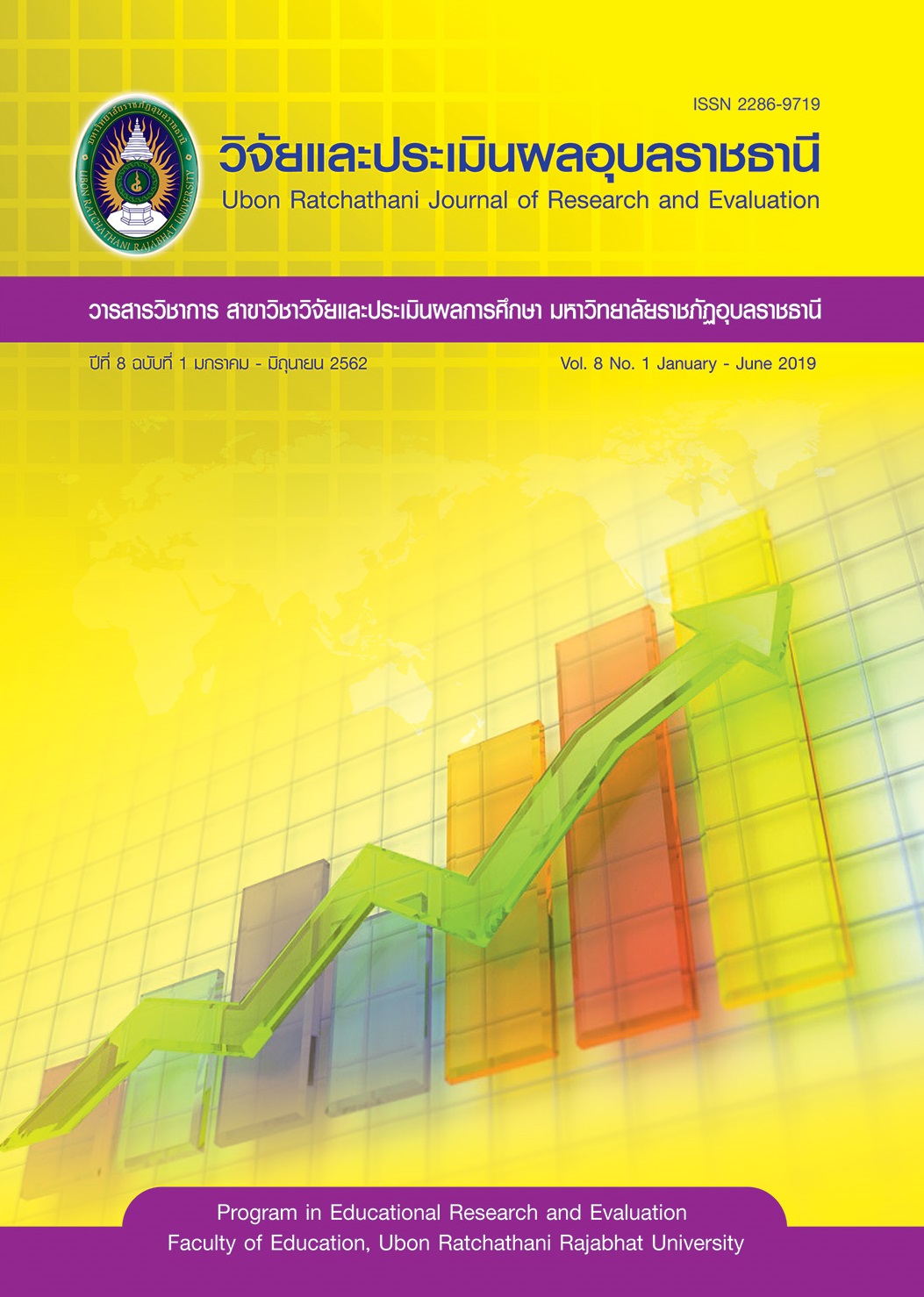A Construction of Good Citizenship Test for Prathom Suksa VI Students under Nongbualumphu Primary Educational Service Area Office 2
Keywords:
Development the Test, Good Citizenship, Prathom Suksa VI StudentsAbstract
The purposes of this research were 1) to construct and develop the good citizenship test 2) to verify the quality of the test, and 3) to construct the normalize T – score base on gender for Prathom Suksa VI students under Nongbualumphu Primary Educational Service Area Office 2. The samples were 550 mentioned students by using multi–stage random sampling. The research instrument was 50 items of good citizenship situation test. The validation of the tests approve by, content validity, the concurrent validity, the construct validity, the discrimination indices and reliability of the test. Then, the Normalized T-Score was created base on the result of the test analysis.
The research findings were as follows:
- The 50 items situational test, 4 multiple choices of good citizenship test for Prathom Suksa VI students was divided into 10 part.
- The content validity of the test showed the index of Item-Objective Congruence (IOC) at the range from 0.60 – 1.00. The concurrent validity of test was 0.84 with the statistical significance at .05 level. The construct validity analysis of the test by using the confirmatory factor analysis method was shown that the measurement model is valid and well fitted to empirical data ( = 72,
df = 15, p-value = 0.62, GFI = 0.99, AGFI = 0.98, CFI = 1.00, RMSEA = 0.00). The discrimination ranged from 0.23 - 0.70. The reliability coefficient was 0.93 - The normalized T-score of the test of male is ranging from T21 - T78 and female from T21 - T78 respectively.
.
References
Chokong, J. (2013). Construction of good citizenship scale for 4-6 high school students under the Secondary Educational Service Area Office 18 (Master’ s Thesis, department of Educational Research and Evaluation). Kasetsart University, Bangkok. [in Thai]
Department of Religious Affairs. (2001). Operating manual policy on moral development for students. Bangkok: Department of Religious Affairs Press. [in Thai]
Inyai, C. (2012). Project evaluation (2nd ed.). Bangkok: Chulalonkorn University Press. [in Thai]
Kessung, P. (2015). Instrument development in educational research and evaluation. Loei Rajabhat University, Loei. [in Thai]
Ministry of Education. (2008). The basic education core curriculum B.E. 2551 (A.D. 2008). Bangkok: The agricultural cooperative federation of Thailand. [in Thai]
Ministry of Education. (2014). Twelve Thai’s values according to the policy of the head of the National Council for Peace and Order (NCPO). Retrieved September 20, 2015), from https://www.moe.go.th/moe/th/news/detail.php?NewID=38658&Key=news20.
Office of the Education Council, Ministry of Education. (2014). Educational research : The critique of Thailand Educational in the 21st Century. Bangkok: Author. [in Thai]
Pattiyatani, S. (2010). Educational measurement. Mahasarakham: Educational Research and Evaluation, Mahasarakham University. [in Thai]
Phusee-orn, S. (2008). Statistics for analysis (2nd ed.). Kalasin: Prasan Printing. [in Thai]
Ritjaroon, P. (2013). Measurement and evaluation in education (9th ed.). Bangkok: House of Kermyst. [in Thai]
Rumpai, H. (2010). Development of desirable characteristic test for grade 3 students (Master’ s Thesis, department of Educational Research and Evaluation). Kasetsart University, Bangkok. [in Thai]
Saisin, W. (2008). A construction of moral reasoning test for unity of the fourth level students in Phattalung Province (Master’ s Thesis, department of Educational Measurement). Srinakharinwirot University, Bangkok. [in Thai]
Saiyot, L., & Saiyot, A. (2000). Educational research techniques (3rd ed.). Bangkok: Suviriyasarn.
[in Thai]
Schermelleh-Engel, K., Moosbrugger, H., & Müller, H. (2003). Evaluating the fit of structural equation models: Tests of significance and descriptive goodness-of-fit measures.
Methods of Psychological Research, 8(2), 23-74.
The Secretariat of The House of Representatives. (2012). Democratic citizenship. Bangkok: Author. [in Thai]
UNESCO. (2011). From green economies to green societies. Retrieved September 22, 2015,
from: https://www.unescodoc.unesco.org/images/0021/002133/21331e.pdf.
Wongrattana, C. (2009). Statistical technique for educational research (11st ed.). Bangkok:
Thainera mitkit Inter Progressive. [in Thai]
Yaghmale, F. (2003). Content validity and its estimation. Journal of Medical Education, 3(1),
25–27.
Downloads
Published
How to Cite
Issue
Section
License
1. บทความที่ตีพิมพ์ในวารสารนี้ได้มีการตรวจสอบการลอกเลียนงานวรรณกรรมแล้ว ไม่เกินร้อยละ 25
2. บทความที่ตีพิมพ์ในวารสารนี้เป็นข้อคิดเห็น ข้อค้นพบของผู้เขียนบทความ โดยผู้เขียนบทความต้องเป็นผู้รับผิดชอบต่อผลทางกฎหมายใด ๆ ที่อาจเกิดขึ้นจากบทความนั้น ๆ
3. บทความ ข้อมูล เนื้อหา รูปภาพ ฯลฯ ที่ได้รับการตีพิมพ์ในวารสารวิจัยและประเมินผลอุบลราชธานี ถือเป็นลิขสิทธิ์ของวารสารวิจัยและประเมินผลอุบลราชธานี หากบุคคลหรือหน่วยงานใดต้องการนำทั้งหมดไปเผยแพร่ต่อหรือเพื่อกระทำการใดๆ จะต้องได้รับอนุญาตเป็นลายลักษณ์อักษรจากวารสารวิจัยและประเมินผลอุบลราชธานีก่อนเท่านั้น และจะต้องมีการอ้างอิงวารสารวิจัยและประเมินผลอุบลราชธานี ฉบับนั้น ๆ ด้วย






